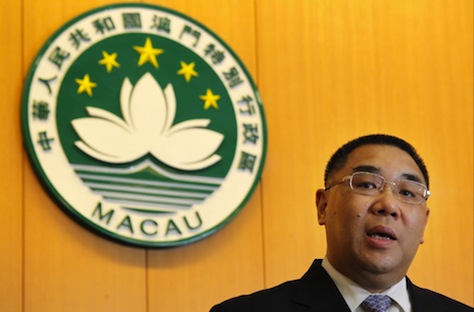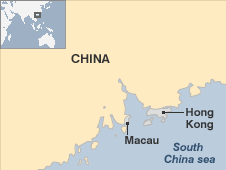 It’s not just Hong Kong that wants a greater voice in selecting its own government — its smaller cousin Macau is increasingly demanding wider democratic choice as well.
It’s not just Hong Kong that wants a greater voice in selecting its own government — its smaller cousin Macau is increasingly demanding wider democratic choice as well. ![]()
![]()
Earlier this summer, activists in Hong Kong waged an increasingly vocal campaign to bring greater democracy to the special administrative region (SAR), through an online referendum advocating the direct election of Hong Kong’s chief executive in 2017, and a movement, ‘Occupy Central with Love and Peace,’ that’s threatened to shut down the city’s downtown core in protest.
The central Chinese government responded with a white paper that appeared to disregard some of the fundamental tenets of the ‘one country, two systems’ principle that’s guided Hong Kong’s administration since its handover from British to Chinese authorities in 1997, forcing Hong Kong’s chief executive, Leung Chun-ying, not known for his democratic sympathies, to work to reduce tension between the two camps.
Perhaps no one was watching the tussle between Hong Kong and Beijing more than the residents of Macau, where its own chief executive, Fernando Chui, will almost certainly win reelection on August 31.
* * * * *
RELATED: Hong Kong: One country, one-and-a-half systems?
* * * * *
Macau, like Hong Kong, reverted only recently to Chinese control — in 1999 from Portuguese colonial authority that stretched back to the 17th century. Like Hong Kong, Macau operates on the principle of ‘one country, two systems,’ and it has its own Basic Law guiding the election of a chief executive and legislature. Unlike Hong Kong, however, Macau’s Basic Law does not include a commitment to ‘one-person, one-vote’ suffrage.
Nevertheless, Macanese activists are organizing their own weeklong referendum on electoral reform meant to coincide with the chief executive election in the hopes of advocating direct election in the next contest in 2019.
The referendum will undoubtedly provide more excitement than the chief executive campaign, in which Chui is the sole candidate. Even if he were facing an opponent, the chief executive is selected by a committee of 400 local Macanese electors, whose allegiance to Beijing and the governing Chinese Communist Party (中国共产党) is assured.
Macau’s legislative assembly, like Hong Kong’s, is composed partly through direct suffrage, with 14 of it 33 members elected directly, another 12 indirectly elected through professional and other constituencies, and a final seven members appointed by the chief executive.
Macau, which has one of the world’s highest per-capita GDPs, has only grown richer in the past five years under Chui’s government, buoyed by the receipts of the world’s largest gaming industry, one that makes Las Vegas look small by comparison. As mainland Chinese citizens become part of a larger middle class with income to spend on vacations, many of them come to Macau, making it both a hub for domestic and international tourism, supplemented by a still robust export trade in manufacturing textiles and garments.
But Chui faced massive protests earlier this year in opposition to a bill that would have awarded larger financial perks to retiring ministers and chief executives, including a monthly stipend of up to 70% for former chief executives, and a special payment for retiring ministers of up to 30% of their salary of each year served in government. Those protests, the largest since Macau’s 1999 handover, forced Chui to abandon the bill in May.
Chui has also faced scrutiny over his role during the administration of Macau’s first post-handover chief executive, Edmund Ho Hau Wah; in particular, Chui was accused of bribery and other corruption with respect to his handling of the 2005 East Asian Games.
Just as Macanese activists watched with interest the Occupy movement earlier this summer, Hong Kong activists will in turn be watching this month’s referendum and chief executive election to see if Beijing responds more gently (or harshly) to Macanese demands. Though Beijing is loathe to allow the spectacle of full-blown Western-style democracy in Hong Kong and Macau, it also knows that taking a hard line with respect to the ‘one country, two systems’ approach could complicate its long-term goal of greater cooperation with Taiwan, which has held itself out as the Republic of China since 1949, and which Beijing very much wants to reunite with the Chinese mainland.
Beijing is also sensitive to scaring foreign investment from its SARs. Macau is a global gaming center and Hong Kong remains Asia’s financial center. Any strong move by China’s central government to disturb the status quo in either Hong Kong or Macau could spook investors.
Photo credit to Dickson Lee / South China Morning Post.
